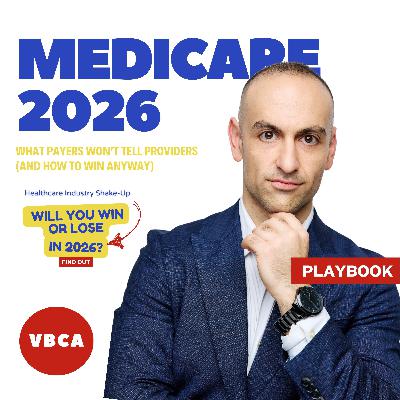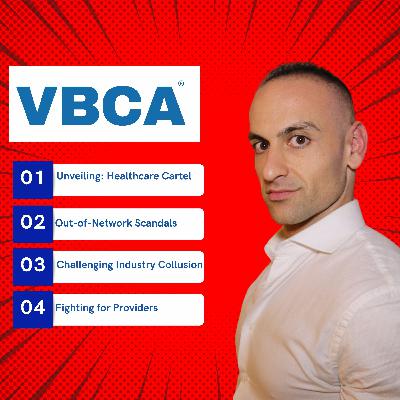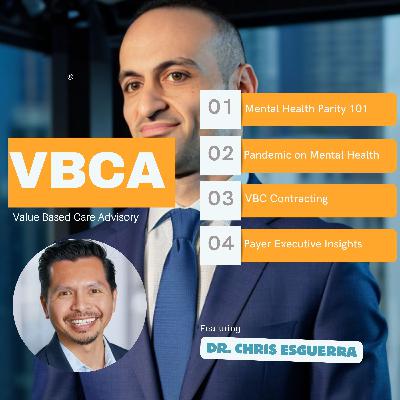Discover Value Based Care Advisory (VBCA) Podcast
Value Based Care Advisory (VBCA) Podcast

Value Based Care Advisory (VBCA) Podcast
Author: Carenodes
Subscribed: 2Played: 17Subscribe
Share
© Carenodes
Description
The VBCA Podcast is a solution-focused platform dedicated to advancing the transformation of healthcare through value-based care (VBC) models. Our mission is to break down complex healthcare topics into accessible, actionable insights for leaders, entrepreneurs, engaged consumers, and anyone passionate about meaningful change in healthcare. By challenging the healthcare industrial complex, we provide tools, strategies, and expert perspectives that empower our listeners to navigate and accelerate the shift toward better outcomes, lower costs, and improved patient experiences.
Each episode delivers thought-provoking discussions and practical advice from industry experts, spotlighting innovative approaches to healthcare reform and highlighting voices that are often overlooked in traditional dialogues. Whether you're a healthcare executive, provider, payer, policy influencer, entrepreneur, or informed patient, we aim to inspire new ideas and support you in driving transformation in the healthcare space.
Powered by Carenodes.
Each episode delivers thought-provoking discussions and practical advice from industry experts, spotlighting innovative approaches to healthcare reform and highlighting voices that are often overlooked in traditional dialogues. Whether you're a healthcare executive, provider, payer, policy influencer, entrepreneur, or informed patient, we aim to inspire new ideas and support you in driving transformation in the healthcare space.
Powered by Carenodes.
18 Episodes
Reverse
While most providers are waiting on CMS, payers are already narrowing networks and rewriting delegation terms.Payers are quietly narrowing networks and rewriting delegation expectations. This playbook explains how to do business with MA business for 2026.If you’re waiting, you’re already reacting—not positioning.In this episode, Alex Yarijanian breaks down what’s actually showing up in payer conversations right now, long before final CMS rules are published. Drawing from real contracting, network, and delegation discussions, Alex explains why waiting for regulatory clarity is already costing providers and health tech companies leverage.You’ll hear how payer priorities have shifted from enrollment growth to margin durability, why network narrowing is accelerating quietly, how delegation has become a stress test, and what “value-based care” really means in Medicare Advantage today.This episode also outlines who is most at risk heading into 2026, the three types of organizations positioned to win, and what provider and health tech leaders should do in the next 90 days to stay relevant.Who should listen: Provider executives, payer leaders, value-based care operators, and health tech founders navigating Medicare Advantage.
A federal jury has convicted the founders of Done, one of the fastest-growing telehealth companies in the stimulant-prescribing space, for orchestrating one of the largest Adderall distribution and fraud schemes in U.S. history. More than 40 million stimulant pills, over $100 million in revenue, and a business model engineered around speed, volume, and automated prescribing — all built with no real clinical guardrails.In this episode, host Alex Yarijanian breaks down not only what happened, but what this case means for the entire digital health ecosystem, especially behavioral health and companies prescribing controlled substances. When a company like Done collapses — and its founders now face up to 20 years in federal prison — it doesn’t just take itself down. It drags trust, access, and payer willingness down with it.Alex outlines how this case will reshape:Payer contracting and credentialingPrescribing oversight and compliance expectationsTrust in telehealth platformsThe future of value-based behavioral healthWhy incentives — good or bad — always scaleAnd most importantly, he explains why value-based care is the antidote to the shortcuts and misaligned incentives that fueled this scandal.If you’re building, funding, regulating, or partnering with telehealth organizations, this is a must-listen.Takeaways:The case of the telehealth startup highlights the critical importance of clinical oversight in health services. Payers are likely to impose stricter regulations on telehealth providers following recent fraudulent activities. Building a sustainable healthcare model requires prioritizing patient interests over profit maximization strategies. The future of digital health will hinge on trust, necessitating alignment between clinical and business models.
Medicare’s 2026 physician fee schedule is packed with change — but change means opportunity. In this episode of the VBCA Podcast, Alex Yarijanian breaks down the five biggest updates every provider and startup should know:Shorter, billable windows for remote monitoringNew behavioral health add-ons to primary careIncentives that reward value-based careExpanded reimbursement for digital therapeutics & telehealthA major shift from inpatient to outpatient proceduresWhether you’re running a clinic or building the next health tech solution, this playbook will help you turn policy into profit and thrive in the future of care.
Welcome back to the Value-Based Care Advisory podcast! In this episode, host Alex Yarijanian delves into the significant updates and strategies for 2026 in the Medicare Advantage space. He covers essential news and policy changes, including a 5% increase in Medicare payment rates, the scaling back of supplemental benefits, and the permanence of telehealth for behavioral health. Alex also discusses updates to the Medicare physician fee schedule, redesigned enrollment forms, new health risk assessment requirements, and the transition to a new risk adjustment model. Learn how these changes will impact care delivery, compliance, and strategy, and discover what it takes to thrive in this evolving landscape. Tune in and prepare for the Medicare Advantage showdown of 2026!00:00 Welcome to the Value-Based Care Advisory Podcast00:15 2026 Medicare Advantage Showdown Overview01:24 Key Policy Updates for 202603:11 Telehealth and Virtual Care Innovations04:39 Enrollment and Form Updates06:12 Risk Adjustment and Star Ratings08:52 Strategic Focus Areas for 202614:44 Final Thoughts and ConclusionTakeaways:The 2026 Medicare Advantage payments are set to increase by approximately 5%, contributing an excess of $25 billion to the plans. Significant changes have been initiated regarding supplemental benefits, particularly affecting non-medical services like transportation and meals. Telehealth services for behavioral health will become a permanent fixture, with no geographic restrictions imposed from 2026 onward. New billing codes will be introduced for digital therapeutics and remote monitoring, enhancing the infrastructure for virtual care delivery. The upcoming risk adjustment model will utilize the full 2024 CMS HCC risk model, significantly impacting financial strategies for Medicare Advantage organizations. Plans must prioritize compliance and operational integrity to navigate the complexities of changing regulations and maintain their competitive edge.
In this episode of the VBCA podcast, host Alex Yarijanian delves into the often overlooked yet crucial aspect of leadership: emotional labor. Discover how managing emotions plays a pivotal role in negotiations and leadership effectiveness. Alex shares personal experiences and insights on how emotional labor can be both a powerful tool and a silent tax on leaders, especially for those challenging dominant norms. Tune in to learn how to harness emotional intelligence to build trust and lead with empathy and strength.Takeaways:In the realm of healthcare leadership, emotional labor serves as an essential yet often unacknowledged component that significantly influences negotiation outcomes. Effective leadership necessitates an acute awareness of emotional dynamics, as managing feelings is integral to fostering productive dialogue among stakeholders. The notion of emotional labor encompasses not just personal emotional management, but also the responsibility to create a supportive environment for others. A leader's capacity to engage in emotional labor can lead to profound transformations, underscoring the importance of empathy and understanding in professional interactions.
This podcast episode delves into the intricate relationship between mindfulness meditation and its profound implications for healthcare leadership. We explore how mindfulness practices not only enhance emotional well-being but also significantly improve the quality and effectiveness of leadership within healthcare settings. Through a rigorous examination of scientific evidence, we elucidate the neurological benefits of mindfulness, demonstrating its capacity to modulate stress and foster cognitive flexibility, thereby enabling leaders to navigate the complexities of their roles with greater composure and efficacy. Furthermore, we provide practical mindfulness training techniques that can be seamlessly integrated into the daily routines of healthcare professionals, offering a pathway to both personal and organizational transformation. Ultimately, this discourse underscores the necessity of cultivating a mindful approach in healthcare leadership to enhance overall performance and well-being.Mindfulness meditation and its application within the healthcare sector represent a profound intersection of neurological research, emotional intelligence, and leadership efficacy. The discussion begins with a thorough exploration of mindfulness, defined as a state of present-oriented consciousness, which fosters a non-judgmental awareness of one's moment-to-moment experiences. This foundational understanding serves as a springboard to investigate the transformative potential of mindfulness practices for healthcare leaders, who are often beleaguered by high levels of stress and burnout. The episode highlights compelling evidence demonstrating that mindfulness can mitigate stress, enhance cognitive flexibility, and improve emotional regulation—qualities that are indispensable for effective leadership in the ever-evolving landscape of healthcare. By integrating mindfulness into their daily routines, healthcare leaders can cultivate a more resilient mindset, ultimately translating into better organizational outcomes and improved patient care.Through the lens of empirical studies, the podcast delves into how mindfulness training yields significant neurological benefits, such as increased white matter density and enhanced executive function. One landmark study cited illustrates that patients undergoing mindfulness-based interventions reported a greater awareness of their symptoms and a reduced identification with negative cognitive patterns—a finding that underscores the therapeutic potential of mindfulness in both clinical and leadership contexts. In practical terms, the episode outlines actionable strategies for implementing mindfulness practices within healthcare organizations, emphasizing that even modest initiatives can catalyze meaningful improvements in workplace culture and employee wellbeing. As the conversation unfolds, listeners are encouraged to reflect on their own practices and consider how mindfulness could serve as a catalyst for personal and organizational growth.Takeaways:Mindfulness training serves as a pivotal mechanism for enhancing the performance of healthcare leaders by fostering emotional resilience and cognitive flexibility. The practice of mindfulness has been scientifically corroborated to mitigate stress levels significantly, enabling leaders to navigate high-pressure environments more effectively. Utilizing mindfulness techniques within healthcare organizations can yield substantial improvements in employee productivity, as evidenced by a notable increase in productive hours per week. Healthcare leaders must cultivate a non-judgmental awareness of their experiences to effectively integrate their internal and external realities, thereby enhancing overall leadership efficacy. Implementing mindfulness practices in healthcare settings has demonstrated substantial positive outcomes, such as reduced burnout among healthcare...
How Health Tech Startups Can Win at Managed Care Contracting: Insider Strategies for Scalable Payer Partnerships.This episode dives deep into the essentials of navigating managed care contracts as a health tech startup. Whether you're a founder, operator, or policy strategist, you'll walk away with a clear understanding of how to position your company for payer partnerships, structure risk-based contracts, and avoid common pitfalls in the healthcare financing space. We explore real-world examples and discuss how to align your innovation with payer priorities, compliance standards, and long-term sustainability. Perfect for early-stage startups, digital health innovators, and anyone looking to scale within the complex world of managed care.Key Themes:Understanding managed care mechanics (HMOs, PPOs, ACOs)Value-based care vs. fee-for-serviceContracting tips for Series A and B stage startupsRisk corridors, capitation, and performance metricsHow to speak the payer language and win trustTarget Audience: Health tech entrepreneurs, product and ops leads, VCs in digital health, provider networks, and healthcare consultants.Takeaways:Understanding managed care contracting is essential for health tech startups to succeed. Health tech entrepreneurs must align their innovations with payer priorities and compliance standards. Effective negotiation strategies are crucial for securing favorable managed care contracts. Startups should utilize data transparency to build credibility and foster trust with payers. Establishing a structured contracting process is vital to avoid unfavorable agreements and ensure sustainability. Learning from real-world case studies can provide invaluable insights into successful managed care strategies. Companies mentioned in this episode:Innovate Health MedTech Solutions Health Wave United Humana Aetna
This conversation explores the historical context of childbirth, the current state of maternal mortality in the U.S., and the emerging role of doulas in modern maternity care. It highlights the paradox of high maternal mortality rates despite advanced medical technology and discusses how doulas can improve outcomes and reduce costs in the healthcare system.Tips are provided to strategically leveraging the doula opportunity in risk-based contracting.Takeaways:The integration of doulas into maternity care significantly reduces unnecessary interventions and enhances outcomes. Evidence demonstrates that doulas can lower postpartum depression rates, benefiting both mothers and healthcare systems. Doulas are increasingly recognized as a strategic component in modern maternity care, facilitating cost savings. Companies mentioned in this episode: Blue Shield Blue Cross
The podcast delves into the complexities and challenges of the American healthcare system, arguing that it often prioritizes profit over patient care. Through the lens of investigative journalism from More Perfect Union, the hosts explore how companies like CVS Caremark and pharmaceutical giants manipulate the system to maximize their profits, often at the expense of those they are supposed to serve. They highlight the troubling trend of Medicare Advantage plans cherry-picking healthier patients to boost their bottom line, leaving those with greater needs reliant on traditional Medicare. The discussion also uncovers the hidden influence of consulting firms like McKinsey, which contribute to a system that seems rigged against everyday citizens. Ultimately, the episode emphasizes the importance of staying informed and advocating for healthcare reform to ensure that the interests of patients are prioritized over corporate greed.The podcast delves into the intricacies and issues surrounding the American healthcare system, raising critical questions about its efficacy and accessibility. The hosts, with the help of investigative journalism from More Perfect Union, examine whether the healthcare landscape is fundamentally designed to benefit corporations rather than patients. They highlight the confusion and frustration many face when navigating healthcare options, particularly Medicare Advantage plans, which are heavily marketed as cost-effective choices but may prioritize profit over patient care. Through examples like CVS Caremark and the impact of the Biden administration's actions against fraud, the discussion reveals how healthcare companies often prioritize their bottom line, leading to detrimental effects on both employees and consumers. With a focus on the systemic issues, the episode emphasizes the need for transparency and accountability in a system that often feels rigged against the average person.The narrative also explores the alarming consequences of corporate control in healthcare, illustrated by the shortage of critical medical supplies, such as IV bags, following Hurricane Helene. The podcast underscores the dangers of having a single company dominate a vital resource, highlighting how such monopolistic practices can endanger lives. Furthermore, the hosts discuss the role of pharmacy benefit managers (PBMs) in escalating drug prices, portraying them as hidden players in a convoluted system that drives up costs for consumers. The episode challenges listeners to consider the broader implications of these practices, urging them to recognize the interconnectedness of corporate greed and public health.Towards the conclusion, the podcast shifts towards empowerment, encouraging listeners to become advocates for change. It stresses the importance of staying informed, engaging with elected officials, and participating in local organizations dedicated to healthcare justice. The episode serves as a call to action, emphasizing that collective efforts can lead to meaningful reforms in a healthcare system that often feels overwhelming and unfair. By fostering awareness and community engagement, the hosts aim to inspire listeners to take ownership of their health care experiences and push for a system that genuinely serves the needs of all individuals, rather than just corporate interests.Takeaways:The American healthcare system is structured to prioritize profits over patient care, leading to widespread issues. Pharmaceutical companies often set exorbitant prices for medications, making them inaccessible to many. Medicare Advantage plans are designed to attract healthier patients, leaving vulnerable individuals behind. The influence of consulting firms like McKinsey perpetuates a culture of profit-driven healthcare. Pharmacy benefit managers operate as middlemen, contributing to rising drug prices and complicating the system. The case of...
What Every Provider and Innovator Must Know Going into 2025:The health insurance industry is facing a perfect storm characterized by rising healthcare costs, increased patient demand, and intense scrutiny from lawmakers. As we move into 2025, the challenges confronting Medicare Advantage plans, once considered the crown jewel of insurer profitability, are becoming increasingly apparent. Industry giants like Humana and UnitedHealth are grappling with significant pressures that could redefine managed care. However, amidst this turmoil, there are opportunities for healthcare providers and entrepreneurs to innovate and adapt. By focusing on high-cost patient areas and exploring innovative contracts, stakeholders can position themselves to thrive in this evolving landscape.This episode delves into the tumultuous state of the health insurance industry as it faces unprecedented challenges heading into 2025. Rising healthcare costs, increased patient demand, and government scrutiny are converging to create a 'perfect storm' for insurers, particularly in the Medicare Advantage sector. This segment highlights how traditional revenue models are being tested as utilization rates rebound post-COVID, with many patients returning for procedures they deferred during the pandemic. Insurers are grappling with higher medical loss ratios (MLR), which are squeezing their profit margins and forcing a reevaluation of their operational strategies. Industry giants like Humana and UnitedHealth Group are highlighted as they navigate this challenging landscape, revealing how their dependence on Medicare Advantage has made them particularly vulnerable amidst shifting policies and scrutiny from lawmakers. The discussion emphasizes the urgent need for healthcare providers and entrepreneurs to identify innovative solutions that can not only alleviate cost pressures but also enhance patient care, suggesting that these turbulent times may present new opportunities for growth and transformation within the industry.Takeaways:The health insurance industry is facing significant challenges due to rising costs and increased scrutiny. Medicare Advantage plans are experiencing financial strain from surging patient demand and utilization rates. As healthcare providers, understanding your patient population is crucial for identifying high-cost areas. The medical loss ratio is a key metric that impacts insurers' profitability and operational strategies. Entrepreneurs should focus on innovative solutions that reduce waste and improve healthcare delivery efficiency. The evolving healthcare landscape presents opportunities for proactive adaptation and strategic partnerships. Companies mentioned in this episode:Humana UnitedHealthCVSAetnaMorgan StanleyResearch Links:There's uncertainty ahead for the health insurance industry in 2025Hearing: Hacking America’s Health Care: Assessing the Change Healthcare Cyber Attack and What’s Next | The United States Senate Committee on Financea...
Welcome to this eye-opening episode of the VBCA Podcast, where we tackle one of the most pressing yet underreported issues in healthcare: hidden fees, surprise bills, and the alleged cartel controlling out-of-network reimbursements.In this episode, host Alex Yarijanian breaks down the allegations against MultiPlan, a third-party repricing company accused of working with major insurers like UnitedHealthcare, Cigna, and Aetna to suppress out-of-network payments. We explore:How MultiPlan's practices impact patients, providers, and employers.The AMA’s antitrust lawsuit accusing MultiPlan of operating a cartel.Real stories, like that of Kelsey Toney, a behavioral therapist forced to turn away patients due to unsustainable payment rates.The staggering $19 billion providers lose annually to these practices.If you’ve ever wondered why your healthcare bills are so high or why your provider suddenly stopped taking your insurance, this is the episode for you.Key Topics Discussed:What are in-network vs. out-of-network providers?How does MultiPlan determine reimbursement rates?The human cost of suppressed reimbursements for providers and patients.Legal implications of the AMA and ISMS lawsuit against MultiPlan.The broader impact on value-based care and healthcare transparency.Takeaways:Hidden fees in healthcare create a sense of unpredictability and financial anxiety for patients. MultiPlan's involvement in processing out-of-network claims often leads to underpayment for healthcare providers. Out-of-network providers typically charge fees that reflect their true cost of delivering services. Patients frequently find themselves responsible for covering the difference in reimbursement rates from insurers. Real-life patient stories underscore the profound human impact of rising healthcare costs and surprise bills. The current healthcare system often prioritizes profit margins over genuine patient care and outcomes. Companies mentioned in this episode: MultiPlan UnitedHealthcare Cigna Aetna Research Links:Legal Complaint (PDF): AMA v. MultiPlan Full Complaint - Filed in the United States District Court for the Northern District of Illinois involves the American Medical Association (AMA) and the Illinois State Medical Society (ISMS) as plaintiffs, suing MultiPlan, Inc. for alleged antitrust violations.Community Health Systems adds another antitrust lawsuit to MultiPlan's collection - Community Health Systems is the latest health system to allege that MultiPlan’s data-driven claims repricing business meets the bar for antitrust violation.AMA lawsuit targets collusion in health care pricingInsurers Reap Hidden Fees by Slashing Payments. You May Get the Bill. - A little-known data firm helps health insurers make more when less of an out-of-network claim gets paid.New York Times Investigation: Health Insurers' Lucrative, Little-Known Alliance - How a private-equity-backed firm called MultiPlan has helped drive down...
This episode explores the rising tide of healthcare startups pursuing value-based care (VBC) with ambitious visions to improve patient outcomes and lower costs. However, without a robust patient acquisition strategy, many founders find themselves struggling to meet volume requirements, maintain contracts, and deliver quality care. Through candid dialogue and practical insights, host Alex Yarijanian addresses these pain points and offers actionable advice for navigating the competitive healthcare market.Segment HighlightsStartup Realities in Value-Based CareAnalogy to Streaming Service Overload: Alex compares the influx of VBC startups to the crowded streaming industry, highlighting how many of these startups lack a practical strategy, assuming that contracts with big payers alone will drive patient volume.Importance of Patient Acquisition: Building meaningful connections and community engagement is critical for driving patient volume—something often overlooked by startup founders. Alex discusses tactics like forming referral networks and partnering with local organizations to build a sustainable patient base.Key Strategies for Healthcare StartupsUnderstanding Payer Volume Thresholds: Alex underscores the need for startups to grasp the minimum patient volumes required by payers to maintain contracts.Patient Engagement & Marketing: Effective marketing and visibility are as essential as clinical quality. Engaging patients through tailored messaging and demonstrating value within local communities can solidify a startup's presence and relevance in the healthcare landscape.New Segment: 'Tough Calls in Healthcare'This episode introduces a new segment, where Alex addresses real-world negotiation dilemmas faced by healthcare professionals. In this installment, he discusses:Negotiating Reimbursement Rates: Tips on understanding local market rates and using data to strengthen negotiation positions with payers.Handling Contract Amendments: Strategies for managing unilateral changes imposed by payers and knowing when to push back or walk away.Key TakeawaysBeyond Business Models: For startups, having a robust business model isn’t enough—securing patient volume is essential.Value-Based Contracts: These can be highly advantageous, but they require a substantial patient base to fulfill the value equation.Community Connection: Building credibility and visibility within the local healthcare ecosystem is crucial.Balancing Act: Startups must balance patient volume and care quality to sustain payer relationships.Negotiation Essentials: Effective contract negotiation includes knowing market benchmarks and maintaining flexibility.Companies Discussed:UnitedHealthcare CignaListeners can expect a blend of in-depth analysis, actionable advice, and fresh perspectives on how to navigate the complexities of launching and sustaining a healthcare startup focused on value-based care.Hospital ER fees: They’ve been secret. We’re uncovering them. | VoxER bills: A baby was treated with a nap. His parents got an $18,000 bill. | VoxCigna hit with class action alleging it used an...
This podcast episode dives deep into the complexities of mental health parity and the implications of the Mental Health Parity Act. The conversation emphasizes the necessity for behavioral health services to be treated with the same level of care and coverage as physical health services, addressing the ongoing disparities in treatment and reimbursement practices. Alex Yarijanian and Dr. Chris Esguerra discuss the challenges providers face when navigating insurance plans and the barriers to accessing equitable care for patients.Dr. Esguerra is board certified in both Psychiatry and Health Care and Quality Management and is a Fellow of the American Psychiatric Association and the American Board of Quality Assurance and Utilization Review Physicians. Dr. Esguerra’s extensive payer-side executive experience includes:Senior Medical Director, Blue Shield of CaliforniaSenior Medical Director, Magellan HealthDeputy Chief Medical Officer, Health Plan Of San Mateo They highlight the critical role employers play in advocating for better mental health coverage and how they can leverage their purchasing power to ensure compliance with parity laws. Ultimately, the episode aims to empower providers with the knowledge and tools necessary to advocate effectively for their patients and promote a more integrated and equitable healthcare system.A significant focus of the episode is on the role of providers in identifying and addressing parity violations. The speakers guide listeners through the necessary steps for raising concerns regarding unequal treatment, emphasizing the importance of gathering evidence and understanding insurance policies. This segment is particularly valuable for behavioral health providers who may face obstacles in securing appropriate coverage for their patients. The discussion also touches upon the regulatory landscape, explaining how self-insured plans differ from traditional insurance plans and the implications this has for parity enforcement. Additionally, the episode discusses the importance of employers in advocating for better mental health coverage, encouraging providers to leverage their relationships with these entities to push for systemic changes that prioritize mental health equity.Takeaways: The Mental Health Parity Act requires equal coverage for both physical and behavioral health services, ensuring that patients receive the same level of care. Providers should gather evidence of parity violations and present it to state regulators to advocate for fair treatment. Behavioral health is lagging behind primary care in integration and reimbursement models, highlighting the need for systemic reform. Employers play a crucial role in advocating for mental health parity by demanding better coverage from their insurance plans. Effective communication and partnerships between providers and health plans can lead to better patient outcomes and innovative care models. Tracking outcomes and demonstrating quality of care is essential for providers to negotiate better contracts with health plans. Companies mentioned in this episode: Blue Shield of California Magellan Kaiser Permanente Google Apple Anthem Centene United Cigna Aetna Humana CalPERS Pacific Business Group on Health National Business Group on Health Chris Esguerra MD MBA
This episode is also available as a blog post: https://healthcare-wiki.com/2022/03/12/changing-demographics-value-based-care/
The system used to pay for health care today does not encourage the integration of health care and social care, nor can it adequately adapt to the trending shift toward value-based payments for care — paying for better quality and better health outcomes. New financing approaches are needed to enable the health care sector to engage in activities that strengthen social care and community resource.This episode is also available as a blog post: https://healthcare-wiki.com/2021/07/21/paying-for-biopsychosocial-care/
No two states are alike in how telehealth is defined and regulated. While there are some similarities in language, perhaps indicating states may have utilized existing verbiage from other states, noticeable differences exist.These differences are to be expected, given that each state defines its Medicaid policy parameters, but it also creates a confusing environment for telehealth participants to navigate, particularly when a health system or practitioner provides health care services in multiple states. In most cases, states have moved away from duplicating Medicare’s restrictive telehealth policy, with some reimbursing a wide range of practitioners and services, with little to no restrictions.One of the most common trends with live video reimbursement was the addition of eligible services to the list of telehealth eligible services, with applied behavioral analysis being the most common service addition mentioned in Medicaid manuals.Additionally, in the wake of the COVID-19 pandemic, some states do seem to be adopting the Center for Medicare and Medicaid Services (CMS) communication technology-based services (CTBS) codes, including the virtual check-in and remote evaluation of prerecorded information, audio-only service codes and remote physiologic monitoring.All fifty states and the District of Columbia have a definition in law, regulation, or their Medicaid program for telehealth, telemedicine, or both. Additionally, because of the allowance in most states to utilize telephone as a form of telehealth during COVID-19, some states are taking steps to broaden its permanent definitions of telehealth or telemedicine by removing the explicit exclusion of telephone or including audio-only services within the definition itself.One of the states with the most significant changes to their telehealth policy was Massachusetts which passed a comprehensive telehealth law to require reimbursement for both Medicaid and private payers if the services are covered in-person and it is appropriately delivered through telehealth. The law contained some unique elements including specifying that the rate of payment for telehealth services provided via interactive audio-video technology and audio-only telephone may be greater than the rate of payment for the same services delivered by other telehealth modalities. It also provided payment parity for in-network providers of behavioral health services delivered via interactive audio-video technology or audio-only telephone only.Read: https://healthcare-wiki.com/2021/08/01/telehealth-landscape-overview-50-states-dc/
During the 2019 legislative session, Florida passed Chapter 2019-137, Laws of Florida, which establishes standards of practice for telehealth services, including patient evaluations, record-keeping, and controlled substances prescribing. The law also authorizes out-of-state health care practitioners to perform telehealth services for patients in Florida. Signed by the Governor on June 25, 2019, this law became effective on July 1, 2019.Out-of-state health care practitioners must be registered with the Florida Department of Health to perform telehealth services for patients in Florida.Health care providers must be licensed within their scope of practice by the appropriate licensing body to practice telehealth in Florida.Providers must also use two-way, interactive communication tools, such as live video, instead of email or audio-only communication. If you use Medicaid, your telehealth provider must be registered with the Florida Medicaid program to receive reimbursement for telehealth services. Florida doesn’t require private insurers to cover telehealth, so check with your insurance company to determine if you’re eligible for the service. Some of these regulations may be altered during the COVID-19 pandemic.In Florida, telehealth providers are permitted to prescribe medications if the medications aren’t listed as controlled substances.Telemedicine Rule, Rule 64B8-9.0141, F.A.C.Controlled substances shall not be prescribed through the use of telemedicine except for the treatment of psychiatric disorders. This provision does not preclude physicians from ordering controlled substances through the use of telemedicine for patients hospitalized in a facility licensed pursuant to Chapter 395, F.S.However, there is one important exception to this rule: If you need a controlled substance to manage a mental health condition, your telehealth provider is allowed to prescribe it.Before prescribing medication, your telehealth provider must conduct an evaluation and explain the risks and benefits of the medication to you.Filling out a questionnaire before your telehealth appointment isn’t enough to satisfy the evaluation requirement, so you should expect the provider to ask multiple questions about your symptoms and health history.This episode is also available as a blog post: https://healthcare-wiki.com/2021/06/22/florida-market-telehealth-rule/A Carenodes Production.
California Governor Gavin Newsom on September 25 signed Senate Bill 855, Health coverage: mental health or substance use disorders, into law. The law increases health and disability insurers' coverage obligations for mental health and addiction diagnosis, prevention, and treatment in the state.


















